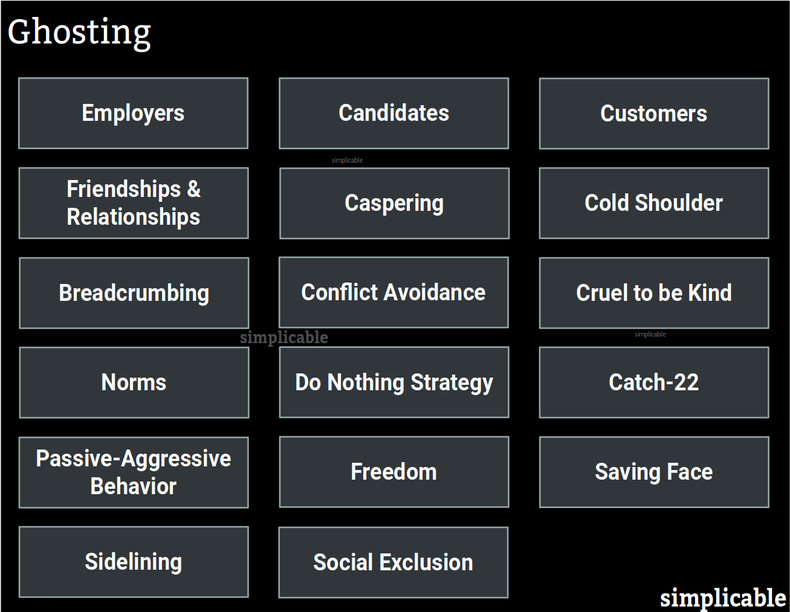
Employers
Failing to notifying candidates that you have been interviewing that you have selected another candidate or that the job opening has been canceled. This can be considered mildly rude but rejection letters also risk being perceived negatively. A polite phone call that simply praises the candidate but states that another candidate has been chosen is most likely to smooth things over. In many cases, a candidate goes on to work for a customer or may become an influential individual in your industry.Candidates
As a candidate, ghosting refers to the poor practice of not showing up to an interview without any notice. A more severe variation of this is accepting a job and not showing up. This is likely to get you blacklisted with the employer. Likewise, the employees impacted by your ghosting may remember you when they go on to other firms.Customers
Ghosting customers refers to the practice of accepting an application or order and then simply not replying in any way. For example, a bank that accepts a mortgage application that then fails to reply. This is an extremely poor commercial practice that deserves the attention of consumer protection agencies.Friendships & Relationships
Ghosting is commonly used to end a correspondence, friendship or relationship. This involves blocking someone or failing to reply to them as a means of discontinuing social involvement with them. This can involve unkind practices such as failing to show up for a plan without any cancellation or subsequent communication.Caspering
Caspering is a gentle form of ghosting whereby you communicate a hint or gentle rejection before ceasing communication. This risks a situation where an individual fails to read your hints such that you end up wasting their time. For example, slowly fading out communication may feel more kind unless its causing the other person not to move on with their life.Cold Shoulder
Cold shoulder is an old term for replying to people in a disinterested way that is designed to give them a hint. This often precedes ghosting as a means to soften its impact.Breadcrumbing
Breadcrumbing is the poor practice of sending short sporadic messages to someone when you have little or no interest in them. This creates false hope and is arguably worse than ghosting.Conflict Avoidance
Ghosting can be motivated by a lack of interest, laziness and simple procrastination. More commonly, it is motivated by a fear of giving negative feedback and a desire to avoid conflict. As such, ghosting has its advocates who believe it is a reasonable way to deal with some social situations. In the real world, people do sometimes act out if you tell them you never want to talk to them again. It isn't irrational to want to avoid this.Cruel to be Kind
I must be cruel only to be kindCruel to be kind is the idea that kindness can waste people's time or fail to give them critical feedback that they need to improve. For example, leading someone on by being nice to them when in fact you aren't interested in any type of social relationship with them. Some examples of ghosting can be viewed as a kindness whereby you politely discontinue communication with someone without explicitly rejecting them. Naturally, this all depends on context. Ghosting can also be quite unkind.
~ Hamlet Act 3, scene 4, 173–179
Norms
Ghosting may be viewed as a norm in certain cultures and situations. For example, discontinuing communication with someone you don't know very well without any explanation can be viewed as a norm in many circumstances. In other words, it isn't always considered polite to specifically notify someone you're rejecting them and ceasing communication if you don't know them very well. Likewise, it can be considered a norm to provide an explanation when ending a long and involved social relationship.Do Nothing Strategy
In game theory, ghosting would be described as a do nothing strategy where often it is in a player's best interests to do nothing.Catch-22
Ghosting can be the result of a catch-22 situation whereby an individual is likely to feel bad if you discontinue communications without notice but may feel equally bad if you tell them you don't want to socialize with them any more. In other words, people may value the closure of knowing how you feel but are also likely to be hurt by any criticism or rejection. This is really a judgement call that depends on factors such as how much you owe the person an explanation and the impact that explanation is likely to invoke.Passive-Aggressive Behavior
Ghosting is often assumed to be passive-aggressive behavior due to its passive nature. However, it isn't often passive-aggressive. For example, it is more often motivated by conflict avoidance as opposed to aggression. Describing ghosting with overly dramatic terms from popular psychology can be accused of attempting to pathologize a common behavior.Freedom
Ghosting is an exercise in freedom as an individual has a right not to socialize with someone. In many cases, it may be triggered by reactance which is an instinct to flee when someone tries to curtail your freedom.Saving Face
Saving face is a culture that avoids embarrassing anyone with direct criticism. Ghosting may be far more common in these cultures as they are conflict avoiding. This doesn't apply to business practices such as hiring as saving face cultures tend to be concerned with professionalism and are likely to reply to job candidates and customers.Sidelining
Sidelining is a political tactic that's similar to ghosting that involves ignoring a political adversary. In the context of office politics, this involves not inviting them to meetings or failing to respond much to anything they say.Social Exclusion
Social exclusion is the practice of shunning someone to prevent their participation in a group or community to which they belong. This is far more serious than ghosting and shouldn't be described as such. For example, being shunned by the other students in a classroom where you have every right to fully participate.Handling Ghosting
Ghosting is typically handled with a process of acceptance. Others are entitled to their freedom. As such, continuing to pursue communication with someone who doesn't want to talk may be viewed as socially unacceptable. Ghosting can create negative feelings but dealing with these feelings in some positive way is likely to make you antifragile.
Sidelining and social exclusion are different and may require that you continue to push into the conversation without allowing yourself to be ignored. For example, if a coworker is trying to sideline you from conversations that are critical to your responsibilities it may be advisable to push into these conversations and demand to be included.
| Overview: Ghosting | ||
Type | ||
Definition | The practice of ignoring someone as a means of ending social or business connections with them. | |
Related Concepts | ||






















